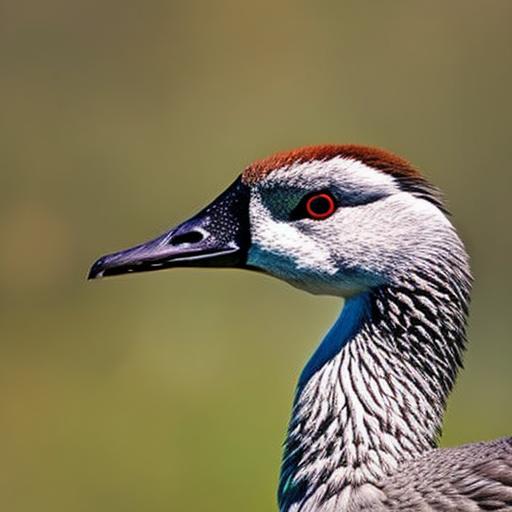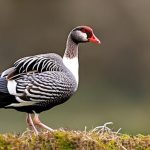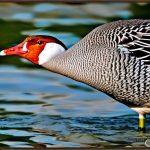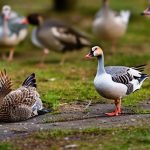Geese are a common sight in many yards and parks, but they can quickly become a nuisance if they decide to make your property their home. These large birds are known for their honking calls and distinctive V-shaped flight patterns. They are attracted to yards for a variety of reasons, including the availability of food, water, and shelter. In this article, we will explore the behavior of geese, why they may be attracted to your yard, and how to keep them away.
Key Takeaways
- Geese can be a common problem in yards and can cause damage and health hazards.
- Understanding the behavior of geese can help in finding effective ways to keep them away.
- Keeping geese out of your yard is important to prevent damage to property and health risks.
- Natural ways to deter geese include planting certain types of vegetation and using decoys.
- Physical barriers, motion-activated devices, repellents, and creating a hostile environment are effective ways to keep geese away.
Understanding the Behavior of Geese
Geese are social animals that mate for life and form strong bonds with their partners. They are known for their elaborate courtship rituals, which involve head bobbing, honking, and wing flapping. Once a pair has formed, they will search for a suitable nesting site. Geese prefer to nest near water, as it provides protection from predators and easy access to food. They build large nests out of grass and other vegetation, usually on the ground or on elevated structures such as docks or rooftops.
Geese communicate with each other through a variety of vocalizations and body language. Their honking calls serve as a way to communicate with their flock and warn of potential danger. They also use body language, such as head movements and wing displays, to convey messages to other geese. While geese are generally peaceful animals, they can become aggressive if they feel threatened or if their nesting site is disturbed. They may hiss, flap their wings, or even charge at intruders in an attempt to protect their territory.
Why Keeping Geese Out of Your Yard is Important
While geese may seem harmless, they can actually pose several risks to your health and property. One of the main concerns is the droppings that geese leave behind. These droppings can contain harmful bacteria such as E. coli and Salmonella, which can cause illness in humans and pets. In addition, the high nitrogen content in goose droppings can damage lawns and gardens, leading to unsightly brown patches and stunted plant growth.
Geese can also cause damage to your property. They have strong beaks that they use to graze on grass and other vegetation. This can result in bald patches on your lawn and damage to flower beds and vegetable gardens. Geese may also trample on plants and dig up soil in search of insects or worms. Furthermore, their constant presence can be a nuisance to your family and pets, as they may become aggressive if approached or if they feel threatened.
Natural Ways to Deter Geese
If you want to keep geese out of your yard without resorting to harmful chemicals or physical barriers, there are several natural methods you can try. One option is to plant certain types of vegetation that geese find unappealing. Geese prefer short, tender grass, so planting taller grasses or native plants with rough textures can help deter them. You can also create barriers using rocks or mulch to make it more difficult for geese to access your yard.
Another natural method is to use decoys to trick geese into thinking that your yard is already occupied. Geese are territorial animals, so the presence of other geese may discourage them from settling in your yard. You can purchase realistic decoys or even make your own using materials such as plastic or wood. Place the decoys near areas where geese are likely to land or nest, such as near water sources or on elevated structures.
Making noise is another effective way to scare geese away. Geese are sensitive to loud noises and will often flee if they feel threatened. You can use noise-making devices such as wind chimes, bells, or even a radio playing at a high volume. Alternatively, you can use your own voice to make loud noises or clap your hands to startle the geese. Just be sure to use these methods sparingly, as geese may become accustomed to the noise over time.
Using Physical Barriers to Keep Geese Away
If natural methods are not effective in deterring geese, you may need to consider using physical barriers to keep them out of your yard. One option is to install fencing around your property. Choose a fence that is at least three feet tall and has small openings or mesh to prevent geese from squeezing through. You can also add a top rail or wire to make it more difficult for geese to fly over the fence.
Netting can also be used to protect specific areas of your yard, such as ponds or gardens. Choose a heavy-duty netting that is at least six feet tall and secure it tightly to prevent geese from getting underneath. Be sure to regularly check the netting for any damage or gaps that may allow geese to enter.
In addition to fencing and netting, you can create physical barriers with landscaping. Planting dense shrubs or hedges around your yard can make it more difficult for geese to access certain areas. You can also use rocks or other large objects to create obstacles that geese cannot easily navigate.
Installing Motion-Activated Devices to Scare Geese

Motion-activated devices are another effective way to scare geese away from your yard. One popular option is motion-activated sprinklers, which release a burst of water when they detect movement. Geese are startled by the sudden spray of water and will quickly learn to avoid the area. These sprinklers are easy to install and can be set up in areas where geese are likely to land or graze.
There are also other types of motion-activated devices available, such as noise makers or flashing lights. These devices work by detecting movement and emitting a loud noise or flashing light to scare away geese. Some devices even have adjustable settings, allowing you to customize the level of sensitivity and the type of deterrent used.
While motion-activated devices can be effective in deterring geese, there are some drawbacks to consider. They may be triggered by other animals or even by strong winds, which can result in unnecessary noise or water usage. In addition, geese may eventually become accustomed to the devices and learn to ignore them. It is important to regularly check and maintain these devices to ensure they are working properly.
Repellents and Sprays to Keep Geese at Bay
If natural methods and physical barriers are not effective in keeping geese out of your yard, you may need to consider using repellents or sprays. There are several types of repellents available that are specifically designed to deter geese. These repellents typically contain ingredients that geese find unappealing, such as grape extract or methyl anthranilate. They can be applied to grass, plants, or other surfaces to create a barrier that geese will avoid.
When using repellents or sprays, it is important to follow the instructions carefully and apply them as directed. Be sure to wear protective clothing and gloves to avoid contact with the product. It is also important to reapply the repellent regularly, especially after rain or heavy watering, as it may wash away over time.
It is worth noting that while repellents and sprays can be effective in deterring geese, they may also have an impact on other wildlife or pets. Some repellents may be harmful if ingested or if they come into contact with the eyes or skin. It is important to choose a product that is safe for use around children and pets and to take appropriate precautions when applying it.
Creating a Hostile Environment for Geese
In addition to using physical barriers and deterrents, there are other ways you can create a hostile environment for geese. One option is to make your yard less attractive to geese by removing or reducing their food sources. Geese are attracted to areas with abundant grass and water, so regularly mowing your lawn and removing any standing water can help discourage them from settling in your yard.
Using sound and light can also be effective in deterring geese. Geese are sensitive to bright lights and loud noises, so installing motion-activated lights or using sound-emitting devices can help keep them away. You can also use reflective objects, such as shiny tape or aluminum foil, to create a visual deterrent that will scare geese away.
Other ways to create a hostile environment for geese include using repellent sprays or applying non-toxic substances that geese find unappealing. For example, you can sprinkle cayenne pepper or garlic powder on your lawn or plants to deter geese from grazing. Just be sure to reapply these substances regularly, especially after rain or heavy watering.
Seeking Professional Help for Geese Infestations
If you have tried various methods to keep geese out of your yard but are still experiencing problems, it may be time to seek professional help. A professional wildlife control service can assess your situation and provide effective solutions tailored to your specific needs. They have the knowledge and experience to safely and humanely remove geese from your property and prevent them from returning.
When choosing a professional service, it is important to do your research and ask for recommendations from friends or neighbors who have dealt with similar issues. Look for a company that is licensed and insured, and ask about their methods for removing geese. It is also a good idea to get multiple quotes and compare prices before making a decision.
Once you have chosen a professional service, they will typically start by conducting a thorough inspection of your property to identify the source of the problem and any potential nesting sites. They will then develop a customized plan to remove the geese and implement measures to prevent them from returning. This may involve using trapping or relocation methods, as well as installing physical barriers or deterrents.
Maintaining a Goose-Free Yard
In conclusion, geese can be a nuisance if they decide to make your yard their home. They can cause damage to your property, pose health risks, and become a nuisance to your family and pets. However, there are several methods you can use to keep geese out of your yard.
Natural methods such as planting certain types of vegetation, using decoys, and making noise can help deter geese. Physical barriers such as fencing, netting, and landscaping can also be effective in keeping geese away. Motion-activated devices, repellents, and sprays can provide additional protection. Creating a hostile environment for geese by removing food sources and using sound and light can also help discourage them from settling in your yard.
If all else fails, seeking professional help may be necessary. A professional wildlife control service can assess your situation and provide effective solutions tailored to your specific needs. By taking action to prevent geese infestations, you can enjoy your yard without the hassle of geese.
If you’re looking for effective ways to keep geese out of your yard, you might also be interested in learning about what vegetables quails eat. Quails are small birds that can be a great addition to your backyard, and knowing their preferred diet can help you create a more bird-friendly environment. Check out this article on poultrywizard.com to discover the vegetables that quails love to munch on. By incorporating these plants into your yard, you can attract quails while deterring geese from invading your space.
FAQs
What are some effective ways to keep geese out of my yard?
There are several ways to keep geese out of your yard, including installing physical barriers, using repellents, and modifying the landscape.
What are some physical barriers that can be used to keep geese out of my yard?
Physical barriers that can be used to keep geese out of your yard include fences, netting, and bird spikes.
What types of repellents can be used to keep geese away?
Repellents that can be used to keep geese away include visual deterrents, such as scarecrows and reflective tape, as well as auditory deterrents, such as loud noises and predator calls.
How can I modify my landscape to keep geese out of my yard?
Modifying your landscape can include removing sources of food and water, planting unappealing vegetation, and creating steep banks or slopes around bodies of water.
Are there any humane ways to keep geese out of my yard?
Yes, there are several humane ways to keep geese out of your yard, including using physical barriers and repellents that do not harm the geese. It is important to avoid using methods that could cause harm or distress to the geese.
Meet Walter, the feathered-friend fanatic of Florida! Nestled in the sunshine state, Walter struts through life with his feathered companions, clucking his way to happiness. With a coop that’s fancier than a five-star hotel, he’s the Don Juan of the chicken world. When he’s not teaching his hens to do the cha-cha, you’ll find him in a heated debate with his prized rooster, Sir Clucks-a-Lot. Walter’s poultry passion is no yolk; he’s the sunny-side-up guy you never knew you needed in your flock of friends!







